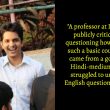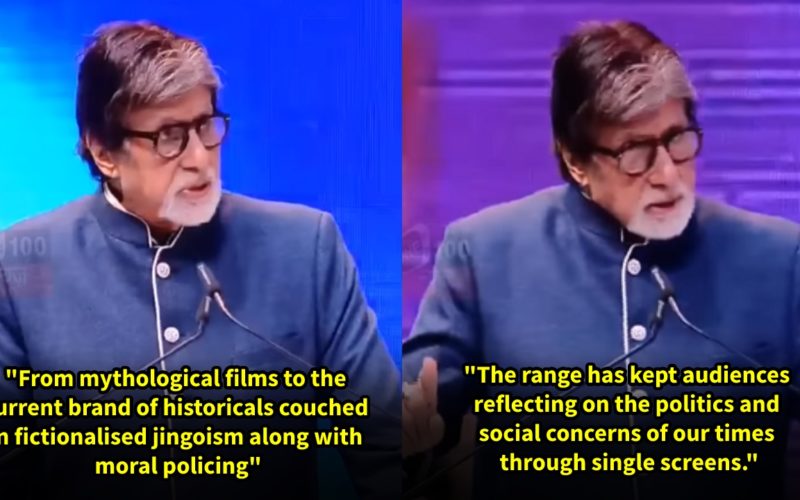It is no secret that celebrities today, especially Bollywood actors, refrain from speaking their minds on the state of the country and the issues we face. Remember the kind of hate Aamir Khar and his then-wife Kiran Rao faced when they expressed their contemplation of moving out of India because of the alarming rise in intolerance? Or when Deepika stood by the students of JNU without uttering a single word? And now, in the age of social media trolling and call for boycotts, actors face the difficult choice of either having a thriving career or expressing their views because one cannot survive alongside the other.
In such times, senior actor Amitabh Bachchan took the risk of speaking publicly about the issues that plague Indian cinema today at the Kolkata International Film Festival held recently. From reminding people how history repeats itself in various ways to calling out the policing and censorship of Indian cinema today, Bachchan was fearless in his 30-minute-long speech, as if he had nothing to lose.

His speech was a brief yet impactful retelling of India’s history and the role cinema played in shaping the socio-political climate. He began way back from the 1st World War, the Spanish Flu and then seamlessly spoke about the British Raj, the advent of Indian cinema, its daring nature and how it was gradually suppressed by increasing censorship laws that anyone and everyone was making by their own will.
“The pandemic has indeed been ruthless – a gruesome situation we were unprepared to face. There was a sudden change in the status quo that altered the very dynamics of global economics, be it in the functioning of business or our film industry. So, today we wonder what is in store for us in the future. Given all possible precautions we can take from a checkered past, in which despite pestilence was changing social dogmas and political turmoil, film industries all over the world have always propagated courage and faced every challenge head-on,” he said.
He kept on mentioning the “egalitarian” and inclusive nature of Indian cinema and how since its arrival it has been calling out injustice against people as a whole.
“Despite these turbulent times, India saw the birth of its film industry that continues to fly the flag high in our 75th year of independence and has managed to keep the egalitarian spirit of cinema alive for over 100 years.”

In his recollection of the two World Wars and how international film industries left behind stories of India’s role in global dynamics, he was indirectly showing us a mirror of current times.
“Nevertheless, within this larger conversation of cultural retellings of two world wars, it is important to look at how India’s film industry responded and how it filtered stories of valour and sacrifice through the prism of cinema and the country’s own struggle for freedom.”
Towards the end of his speech, he was unafraid in highlighting the lack of freedom of expression that plagues the film industry today. He was direct in pointing out that today we have “historicals couched in fictionalised jingoism along with moral policing”.
“Even now, I’m sure my colleagues on stage would agree, questions are being raised on civil liberties and freedom of expression. Since those early times, there have been many changes in cinema content, productions, star systems, the way films are viewed by audiences. Subjects have also been vastly varied. From mythological films and socialist cinema, arthouse cinema…to the current brand of historicals couched in fictionalised jingoism along with moral policing – the range has kept audiences reflecting on the politics and social concerns of our times through single screens, videos, multiplexes, and now the OTT.”
Please take out the time to listen to his full speech here:
“Where the mind is without fear and the head is held high…”
Kudos to Amitabh Bachchan!




